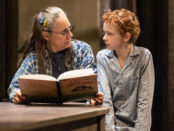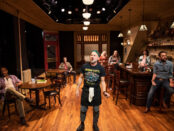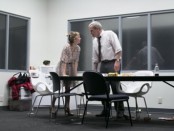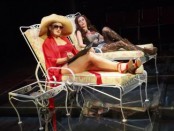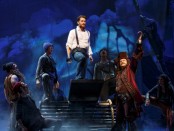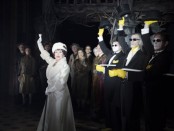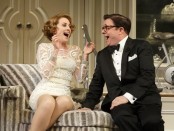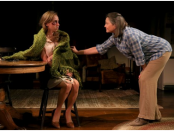Scott Pask
Scott Pask is an award winning Scenic Designer, who was raised in Yuma Arizona. He received his Bachelor Of Architecture degree from the University of Arizona, and his Master of Fine Arts degree from the Yale School of Drama. His Broadway credits, designing both scenery and costumes include: The Pillowman , with Billy Crudup and Jeff Goldblum, A Behanding in Spokane, Starring Christopher Walken, and A Steady Rain with Daniel Craig and Hugh Jackman. He was Awarded his first Tony award for the Scenic design of Martin McDonagh’s The Pillowman, which he originally designed for the National Theatre in London. Visit Scott’s website
How much you enjoy 'Gutenberg! The Musical!" likely depends on a combination of factors entirely unrelated to that German fellow: familiarity with the tropes it's skewering; your own level of disdain for such hackney execution; and your tolerance for Rannells and Gad's incessant mugging. In their first Broadway pairing since "The Book of Mormon" over a decade ago, Rannells and Gad are less a comic team than a comic rivalry, with neither willing to be the Abbott to the other's Costello. Fortunately, their ping-ponging, look-at-me dynamic only occasionally grows tiresome, usually when either of them is trying to gin up laughs that aren't there or shouldn't rise above a tee-hee. [more]
Grey House
Eerie and irritating in equal measure, Levi Holloway’s "Grey House" at the Lyceum Theatre dredges up the classic plot device of many horror films: strangers stumbling into a den of oddballs and suffering the consequences. The couple that does, indeed, invade the eponymous domicile, Max and Henry (Claire Karpen – subbing for Tatiana Maslany - and Paul Sparks, both excellent) actually refer to this conceit and even joke that the results are always bad. Sometimes this premise results in hilarity as in "The Rocky Horror Picture Show" and sometimes, as in "Grey House," it causes unintended hilarity for its obvious stunts (faces at a window, smoke emanating from a scary basement) along with some gruesome imagery, too bloody to describe here; but suffice it to say Henry, whose left leg is injured in a snowstorm-caused car/deer collision, suffers in a ghastly manner. That the car was driven by his wife doesn’t help matters. [more]
On The Town with Chip Deffaa: At “New York, New York,” “Some Like It Hot,” and Seth Sikes & Nicholas King’s Nightclub Act
In the last few weeks I feel like I’ve been stepping back in time—in a nice way. I’ve enjoyed seeing the new Broadway musicals "New York, New York" (set in 1946-47) and (with some definite reservations, which I’ll get to shortly,) "Some Like It Hot" (set in 1933). And although the current nightclub act of Seth Sikes and Nicolas King is set in the present, most of the Great America Songbook numbers that they sing were written long before they were born; and they put those numbers across with terrific razzle-dazzle showmanship—the kind you always hope to see in clubs but all-too-rarely do. [more]
Shucked
In addition to a surfeit of approximate rhymes, the score for Shucked includes a paean to corn and a reprise of the following ready-for-Hallmark advice: "maybe love is like a seed/a little sun is all you need." Meanwhile, Horn blithely salts the earth with acerbic observations about how "marriage is simply two people coming together to solve problems they didn't have before." Foregoing any accountability for this philosophical inconsistency, director Jack O'Brien instead attempts to cover for it with turbo-charged pacing that not only sacrifices thought for an admittedly infectious energy but also, as a part of this devil's bargain, undermines the comic timing necessary for a lot of Horn's jokes to land properly. But the amiable cast never falters, even when the laughs do or the score becomes more saccharine than corn syrup. The cast is adept, too, at executing Sarah O'Gleby's inventive choreography on scenic designer Scott Pask's ramshackle barn of a set. Particularly enchanting is a rolling barrel dance that Durand daringly pulls off with impressive grace. It's just too bad that this delightful surprise isn't accompanied by many others. [more]
Cornelia Street
Although British playwright Simon Stephens has written three musicals with composer/lyricist Mark Eitzel, formerly of the indie rock band American Music Club, Cornelia Street, set on a quiet back street in the West Village, is the first to arrive in New York where it is having its world premiere courtesy of Atlantic Theatre – Stage 2. Led by two-time Tony Award winner Norbert Leo Butz who is on stage almost throughout the show, "Cornelia Street," an elegy for a bygone age of unique Village restaurants and coffee houses, does not give its cast enough to do. The songs do not forward the plot but tell us what we already know, and the plot such as it is does not get going until the second half. An interesting attempt to create a place and its regular denizens on stage, "Cornelia Street" in this form does not make a satisfying statement. [more]
Some Like It Hot
Matthew López & Amber Ruffin (book) and Marc Shaiman & Scott Wittman (music and lyrics) have transformed the written-for-laughs film into a joyous musical, keeping much of the sharp wit of the original. Most importantly, they added heart and even a surprisingly contemporary spin or two, buoyed by the brilliance of Casey Nicholaw’s direction and choreography (although all those knee slides made me worry for the talented dancers’ health!) [more]
Ain’t No Mo’
Jordan E. Cooper’s scathing new racial comedy, "Ain’t No Mo’" has made the successful transition to Broadway with five of the six original actors from the previous Public Theater staging in 2019 and a more elaborate physical production from an almost entirely different design team. Delving into Black life and attitudes now, the play is hilarious, but not laugh-out-loud funny, rather it's impressive because of its cleverness, but its satire does not trigger laughter. However, its outrageous form of satire may not appeal to all theatergoers. [more]
1776
Directed by Jeffrey L. Page (who also did the simplistic choreography) and Diane Paulus, this production’s well-meaning gimmick is to have all the historic characters played by a “cast that includes multiple representations of race, ethnicity and gender [who] identify as female, transgender and nonbinary,” to quote the exacting language of the production’s press release. This casting coup works most notably as a political statement, hopefully forcing the audience take a fresh look at the original all-male contingent, however brilliant they may have been, and their flaws. The word “woman” never appears in the Declaration of Independence (nor the Constitution) and the millions of Black slaves were quite purposely and expediently left out of the Declaration. This multi-racial cast is a not-so-subtle slap in their faces. [more]
American Buffalo
The 1975 play "American Buffalo," now onstage at the Circle in the Square Theatre in a crackling revival, remains the quintessential Mamet experience, the one that should be seen to fully appreciate what has been lost. Essentially a two-hander masquerading as a three-hander, it's a character study short on plot and long on self-delusion as a couple of small-time crooks imagine themselves as much more than they are while planning an ambitious heist. To say they're all talk gets to the satirical heart of Mamet's play. [more]
Mr. Saturday Night
Anyone else may find this decent show to be a tired affair which just about sustains its two-and-half-hour running time. The memory-piece book by Crystal, Lowell Ganz and Babaloo Mandel is based on their screenplay which ranges from the 1950’s to the 1990’s. It intends to be a loving tribute to a bygone show business era and fitfully succeeds at that. The schmaltz-laden dramatic writing never really rises above the rudimentary, rendering the events and conflicts with patness and clichés. Still, it offers choice roles that are marvelously performed by the other cast members. [more]
Socrates
For all you philosophy junkies out there—and you know who you are—Tim Blake Nelson’s world premiere "Socrates" at The Public Theater, the shining light of The Public’s Onassis Festival, is a treasure trove of ideas bantered, tossed, shredded and otherwise analyzed by a stage-full of ancient Greeks, led by the title character played with dignity and passion by the phenomenal Michael Stuhlbarg (the father in the film "Call Me By Your Name") and a cast of 16 mostly playing multiple roles. [more]
The Prom
"The Prom" is giving Broadway something it’s been lacking for years, which is a high-spirited, old-fashioned musical comedy, where the cast’s energy spills out over the footlights, and is then reflected in all the smiling faces you encounter as you leave the theater. It’s the equivalent of a standing ovation that moves out into the streets. [more]
Carmen Jones
Unlike the musicals "Rent" (an update on Puccini’s "La Boheme"), and "Miss Saigon' (inspired by Puccini’s "Madame Butterfly") both of which had all new music by other composers for their contemporary stories, "Carmen Jones" uses the original Bizet score. However, it is not simply an English translation. Hammerstein has written all new lyrics to place the story in a W.W. II Southern community (possibly North Carolina) and with the characters ending up in Chicago for the denouement. While "Carmen Jones" was a smash hit originally running for 503 performances at the Broadway Theatre during the war years, some like then critic James Baldwin found the dialect that Hammerstein had used for his African-American characters both embarrassing and demeaning, and the show has not had a New York revival until now. Notwithstanding, the first London production in 1991-92 was also a tremendous success at the Old Vic Theatre with a mix of both opera and theater stars in the cast. [more]
Saint Joan
After "Ruined" and then last year’s "A Doll’s House, Part 2," Condola Rashad is fast establishing herself as one of our finest young actresses. She is presently back on Broadway, offering a steely and, shall we say, saintly performance as the title character in George Bernard Shaw’s "Saint Joan" at the Manhattan Theatre Club’s Samuel J. Friedman Theatre. [more]
Mean Girls
Fey has made two successful changes to theatricalize her original screenplay. The story is now cast as a flashback narrated by best friends Goth Janis (Barrett Wilbert Weed) and Damian (Grey Henson), described as “almost too gay to function,” to the new freshman class as a cautionary tale as to “how far you would go to be popular and hot.” She has also updated the story to include smartphones, selfies, and reference to current events (the Russians and President Trump’s twitter account.) [more]
The Band’s Visit
Yazbek’s songs—ranging from the darkly comic “Welcome to Nowhere” (sung by the town folk) to Dina’s romantically tinged “Omar Sharif” and ending with the upbeat, danceable “Concert” played as a finale by the Band—rise magically from the dialogue, just as Patrick McCollum’s choreography emerges naturally from walking, singing and thinking. [more]
On the Shore of the Wide World
Neil Pepe’s production of Simon Stephens’ "On the Shore of the Wide World" will not please all. The pace is consciously slow – like the life lived by these characters. However, the wait is worth the effort. By the end when the family reunites for Sunday dinner, the play has become both powerful and poignant. The title, incidentally, comes from the next to the last line of John Keats’ sonnet, “When I have fears that I may cease to be” in which the speaker worries about missing out on love, fulfillment, fame and success, apt summation of Simon Stephens' play. [more]
The Band’s Visit
Seven musicians of Egypt’s Alexandria Ceremonial Police Orchestra have been sent to Israel to open the new Arab cultural center at Petah Tivah. Due to a mix up at the border, they end up in the dead-end desert town of Bet Hatikva which has no hotel, no culture, and no bus until the morning. However, their visit is the most interesting thing to happen in Bet Hatikva in years as these unlikely visitors represent something different from the outside world. Restaurant owner Dina (Lenk) once a dancer in a big city, now resigned to her boring fate, takes pity on them, feeds them and arranges for them to stay the night in three places including her home. She takes dour, formal conductor Tewfiq (Shalhoub) and young ladies’ man, Haled (Ari’el Stachel). Although the visit is only one night, none of them will ever be the same again. [more]
Dead Poets Society
That sequence is just one of the highlights of John Doyle’s commanding direction. Best known for his vibrant minimalist approach to musicals, Mr. Doyle brings that precise and visually expressive focus to this play. The cast of ten is expertly placed and moved around the relatively bare and spacious stage creating tension, excitement and striking tableaus that all connect to the story. There are also many presentational flourishes. [more]
The Cherry Orchard
Directed by high profile new British director Simon Godwin, associate director of the U.K.’s National Theatre, making his New York debut, this "Cherry Orchard" seems to have no interpretation or explanation for a new staging. Stephen Karam, the author of last season’s acclaimed "The Humans," has written a new version which seems to be heavy on American ideas in this Russian play, while both the sets and costume designs get in the way of coherence and understanding. All in all this is a great disappointment considering the talent involved. [more]
Oh, Hello on Broadway
In the guise of two old Upper West Side bachelor geezers, Kroll as failed actor, Gil Faizon, and Mulaney as failed writer, George St. Geegland, wander about Pask’s brilliant combination apartment/beauty salon/TV studio/street set, musing out loud about their lives, wearing dreadful wigs (credit Leah Loukas) and speaking in a bizarre accent which, for example, turns “Broadway” into “broodway,” “an” into “en” and “homage” into “home page.” [more]
Incognito
This is heady theater and demands concentration. However, the excellent cast of four made of Geneva Carr (Theatre World Award winner for "Hand to God"), Charlie Cox (Netflick’s" Daredevil"), Heather Lind (AMC’s "Turn: Washington’s Spies"), and Morgan Spector (Drama Desk Award nominee for "Russian Transport") make this an unforgettable evening in the theater. The versatile cast play 20 characters, some as many as six, without changing costume but with different accents and demeanors, while the succeeding scenes take place almost as fast as the synaptic functions in the brain. The play which alternates in its telling of the three stories is also divided into three parts: "Encoding," "Storing' and "Retrieving." Before each section the cast perform hand gestures create by Peter Pucci that mimic the synaptic actions in the brain. [more]
Waitress
The musical’s new libretto, written by Jessie Nelson, riffs broadly on Shelly’s quietly poignant storyline and her very human, finely etched characters. The characters, broadened and amped up several notches to register on the large stage of a Broadway house, eventually do endear themselves even if they are just a bit shy of caricature. Singer-songwriter Sara Bareilles’ music and lyrics further perpetuate the broad brush paint job with all the characters getting an exultantly defining number that elucidates their eccentric stories or the turmoil in their minds. [more]
The Father
Florian Zeller is the most famous French playwright you probably never heard of. He won France’s highest theatrical honor, the Moliere Award, in 2011 for his play, "The Mother," and the Moliere Award again in 2014 for "The Father." This last named international hit is currently running in both Paris and London with major stars in the leading role. Manhattan Theatre Club now brings the Christopher Hampton translation to Broadway with Frank Langella in the title role. As André, an 80-year-old man beset with dementia in which his reality keeps shifting, Langella turns in a virtuoso perform but you won’t be bored for a moment. [more]
Blackbird
The problem with the staging begins from the outset. Daniels' Ray, tense and rigid, pushes demanding, triumphant Una into a corporate break room. He is upset to see her, and she is all confidence and gloating. Unfortunately, this scene starts at so high a peak of emotion that the play has nowhere to go. In fact, while their startlingly different accounts of the night they ran off together ought to be the high point of the play, the opening scene is peak of emotion instead. It is a calculated risk and it damages the play. [more]
First Daughter Suite
Twenty-two years after writing "First Lady Suite," four linked musicals about Eleanor Roosevelt, Bess Truman, Mamie Eisenhower, Jacqueline Bouvier Kennedy and Lady Bird Johnson, composer-lyricist Michael John LaChuisa has written a follow-up. Entitled "First Daughter Suite," it also contains four mostly sung-through musicals and depicts six of the Presidents’ daughters as well as six of the First Ladies. The individual pieces vary in content, seriousness and musical style: opera, jazz, pop and Broadway. While the material is impressive, the first two musicals are very lightweight while the other two included in the second half of the evening are much more profound. However, what First Lady Suite does best is offer several veteran singing actresses a chance to appear in extremely meaty roles, turning each of their roles into a tour de force. This is the fifth collaboration between LaChuisa and director Kristen Sanderson who directed the original production of "First Lady Suite" which also premiere at the Public Theater. [more]
An Act of God
This 90-minute intermission-less play is a comic and occasionally serious address to the audience by God who often sits on a large white couch as he revises The Ten Commandments. Some are kept and some are replaced by new ones during his arch analysis of human history. Angels Gabriel and Michael who also go out into the audience to take questions assist God. [more]
Something Rotten!
"Something Rotten!" isn’t just for insiders, though. Its pleasures are multiple: a divinely hyper cast led by Mr. d’Arcy James, John Cariani (sweet and lovable as Nick Bottom’s feckless younger brother, Nigel) and Christian Borle (manically over the top as a rock star Shakespeare); a fabulously tongue-in-cheek Tudor-ish set and costumes (Scott Pask and Gregg Barnes); a bouncy, funny score (Wayne Kirkpatrick and Karey Kirkpatrick); and the wittiest, non-stop choreography on Broadway (Casey Nicholaw who also directed). Mr. Nicholaw’s pacing is breathtaking. It’s almost too exhausting to keep up with the unstoppable cast. [more]
Finding Neverland
Directed by the usually innovative Diane Paulus (whose credits include the critically acclaimed "Hair," "Porgy and Bess," "Pippin"), "Finding Neverland" has been created by the numbers and its staging suggests a great many earlier musicals. The score by Gary Barlow & Eliot Kennedy, long associated with the UK band, Take That, and writing their first musical, is filled with serviceable and prosaic ballads and anthems (with many false rhymes) to pleasant melodies but none which really forward the story. With titles like “Believe” and “Neverland,” they often have an overly familiar feeling. While Finding Neverland steals shamelessly from the 1954 Jule Styne-Comden & Green musicalization of Barrie’s play"Peter Pan," it never comes close to the charm of that earlier musical. [more]
Airline Highway
Unlike D’Amour’s last New York play, "Detroit," a Pulitzer Prize finalist which had four characters and a tight arc, "Airline Highway" is diffuse and sprawling with a large cast of 16 actors ably piloted by director Joe Mantello. Set in the shabby, rundown Hummingbird Motel on New Orleans’ Airline Highway, the play introduces us to a colorful but down-and-out cast of characters just eking out a living: Krista, a now homeless stripper in her 30’s; Tanya, a 62-year-old hooker and drug addict; Terry, an African American handyman always in need of money; Francis, a 50ish poet who seemed to have missed his moment, and Sissy Nan Na, a transvestite bartender and karaoke wrangler on Bourbon Street of African American and Puerto Rican descent. The motel is managed by Wayne, in this late 50’s, always good for a soft touch or ready to tell his life story. [more]
The Visit
The illustrious Chita Rivera appears in an elegant floor length white dress and bedecked with jewels. The grande dame’s presence electrifies the audience. Unfortunately, with little to work with, she postures and delivers McNally’s lines the best she can. Along with co-star Roger Rees as Anton Schell, her lover from the old days, she breathes some life into the song, “You, You, You.” When she dances, the ball is back in her court. There is a magnificent moment when she dances with her younger self (Michelle Veintimilla). Sensitively choreographed by Daniele, they do a sweet dream-like duet with grace and passion, the highlight of the evening. [more]
It’s Only a Play
The revival of Terrence McNally's theater comedy, It's Only a Play, has the starriest cast in town. It reunites Tony Award winners Nathan Lane and Matthew Broderick for the third time, and throws in for good measure Oscar Award winner F. Murray Abraham, Tony Award winner Stockard Channing, Harry Potter regular Rupert Grint, and Emmy Award winner Megan Mullally. This is probably just as well as this 1985 farce was slight in its Off Broadway production and in its first Broadway appearance, drastically updated, it seems even thinner. Jack O'Brien, who usually directs stronger stuff, pilots the expert cast around their paces. [more]
When We Were Young and Unafraid
Yes, it's TV soap trap. Yes, it's really good movie. And yes, it's some of the best theater, because it's the purest entertainment, storytelling, the hardest and the easiest thing to do, all in one. People are endlessly fascinating. All you need is Sarah Treem to let you in. [more]


